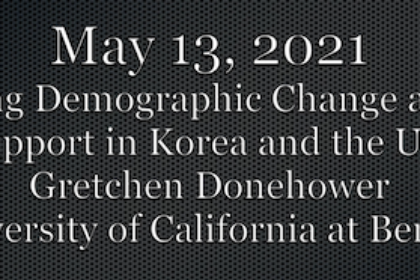
Care support ratios are a simple method to evaluate how demographic change may impact care economies while including the unpaid care work part of the economy, often overlooked. During the second day of the Concluding Annual Meeting, Dr. Gretchen Donehower (University of California at Berkley) presented collaborative research with Dr. Bongoh Kye (Kookmin University, South Korea) that examines whether the production of care could sustain its consumption by combining current age profiles of the society with possible future demographic changes that could occur in the US and South Korea
To calculate care support ratios, you must first estimate current age profiles of some type of care, i.e., eldercare or childcare. Secondly, you need to produce these ratios for some scenarios of future change, i.e., population projections that take the effect of the aging population on the care economy into account. Finally, you estimate the aggregate production and consumption based on the age profiles of this future scenario and take the ratio of the two to give you the care support ratio.
The current age profiles show that women perform a significant proportion of unpaid, non-professional, and professional care work in the US and South Korea, with care provisioning peaking at childbearing and retirement years. Children consume the highest amounts of all three types of care, while the elderly show a greater demand for professional care. The results show that as the South Korean population continues to age, there will be a significant challenge to providing the levels of care required. The US will face a similar challenge, but it would not be as significant as South Korea’s.
To watch the full presentation, see below.
Written by Praveena Bandara, Research Assistant for the Care Economy Project and PhD student in Economics at American University.
